Adolescent Girls’ Agency in an Integrated Sexual and Reproductive Health and Economic Empowerment Intervention Pilot
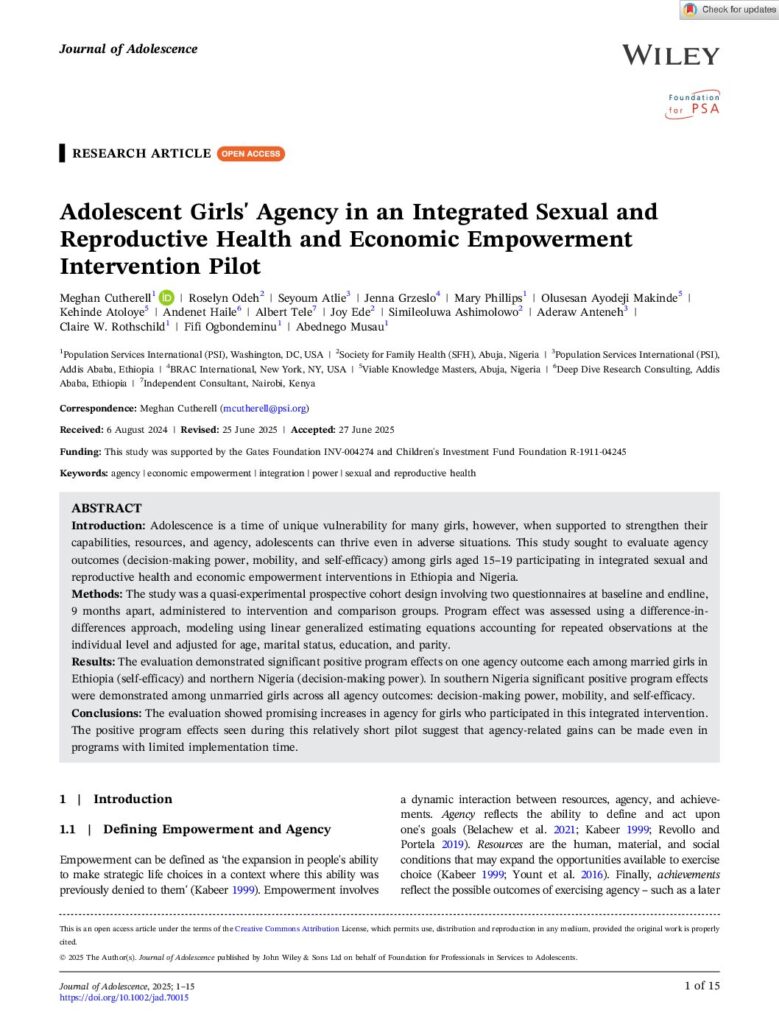
Meghan Cutherell, Roselyn Odeh, Seyoum Atlie, Jenna Grzeslo, Mary Phillips, Olusesan Ayodeji Makinde, Kehinde Atoloye, Andenet Haile, Albert Tele, Joy Ede, Simileoluwa Ashimolowo, Aderaw Anteneh, Claire W. Rothschild, Fifi Ogbondeminu, Abednego Musau First published: 25 June 2025 | https://doi.org/10.1002/jad.70015
Person-Centered Measurement: Ensuring Prioritization of Individuals’ Values, Needs, and Preferences Within the Global Contraceptive Measurement Ecosystem
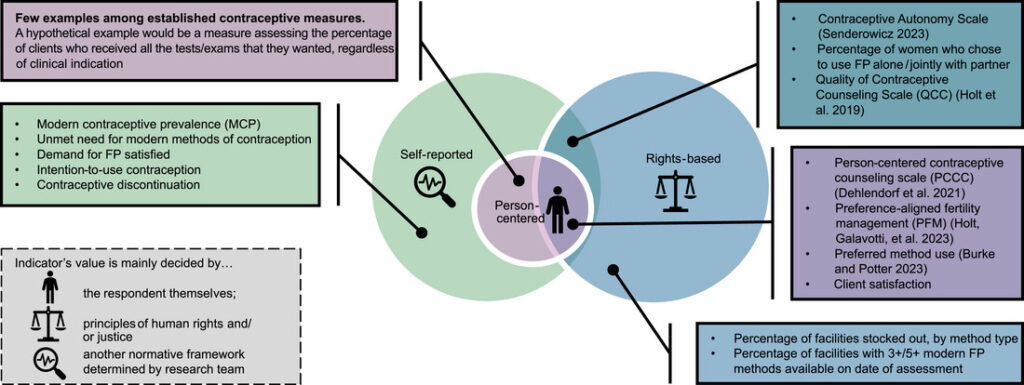
Claire W. Rothschild, Kelsey Holt, Funmilola M. OlaOlorun, Julius Njogu, Abednego Musau, Christine Dehlendorf First published: 23 June 2025 | https://doi.org/10.1111/sifp.70023 Claire W. Rothschild, Population Services International, Washington, DC 20036, USA. Email: [email protected]. Kelsey Holt, University of California, San Francisco, San Francisco, CA 94143, USA. Funmilola M. OlaOlorun, Department of Community Medicine, College of Medicine, University of Ibadan, Ibadan, Nigeria. […]
Data-driven program adaptation and continuous improvement: A case study of the Adolescents 360 (A360) project in Ethiopia, Nigeria, and Tanzania
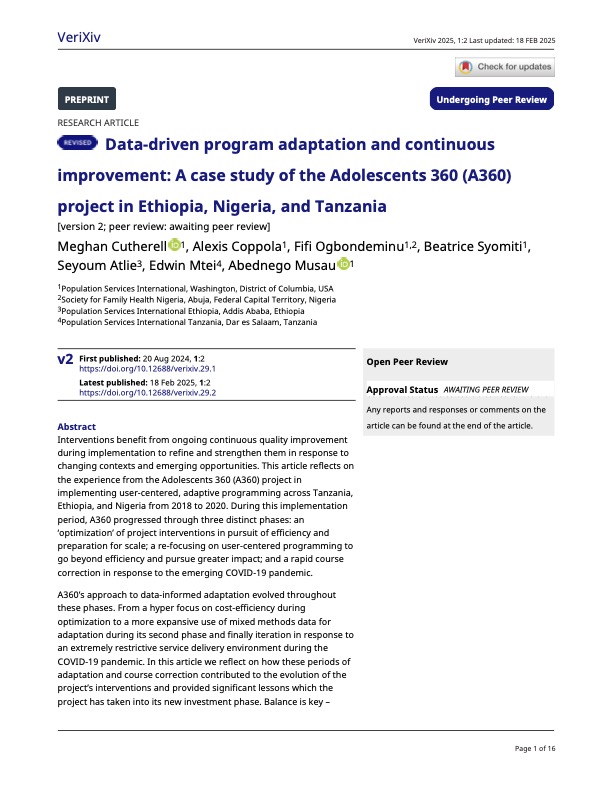
Interventions benefit from ongoing continuous quality improvement during implementation to refine and strengthen them in response to changing contexts and emerging opportunities. This article reflects on the experience from the Adolescents 360 (A360) project in implementing user-centered, adaptive programming across Tanzania, Ethiopia, and Nigeria from 2018 to 2020. During this implementation period, A360 progressed through […]
Preference-aligned fertility management among married adolescent girls in Northern Nigeria: assessing a new measure of contraceptive autonomy
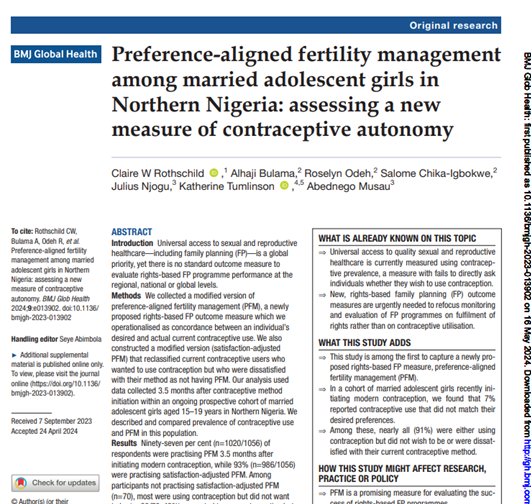
In this article, published in BMJ Global Health, we reflect on the value of utilizing a new measure of contraceptive autonomy through its testing in A360’s continuation cohort study in northern Nigeria. Original article published via BMJ. Abstract: Introduction Universal access to sexual and reproductive healthcare—including family planning (FP)—is a global priority, yet there is […]
Applying Human-Centered Design to Replicate an Adolescent Sexual and Reproductive Health Intervention: A Case Study of Binti Shupavu in Kenya

By Nancy Njoki, Meghan Cutherell, Abednego Musau, David Mireri, Alex Nana-Sinkam and Mary Phillips If something works in one place, it should work in another…right? In public health, it’s not usually that simple. Different people, different health systems, and different challenges mean evidence-based practices do not always translate easily. In a new article from Global Health Science and Practice, we share […]
Effect and cost-effectiveness of human-centred design-based approaches to increase adolescent uptake of modern contraceptives in Nigeria, Ethiopia and Tanzania: Population-based, quasi-experimental studies
By Catarina Krug et al. Around half of adolescent pregnancies in low- and middle-income countries are unintended, contributing to millions of unsafe abortions per year. Adolescents 360 (A360), a girl-centred initiative, aimed to increase voluntary uptake of modern contraceptives among adolescents in Nigeria, Ethiopia and Tanzania. This article, published in Plos Global Public Health presents […]
Balancing evidence-informed and user-responsive design: Experience with human-centered design to generate layered economic empowerment and SRH programming in Tanzania, Ethiopia, and Nigeria
by Meghan Cutherell, Mary Phillips, Carrie Eleett, Emnet Woubishet, Joy Otsanya Ede, Akinjike Adesina, Arnold Kabahaula, Alex Nana-Sinkam, Abednego Musau, Katherine Nichol In 2021, the Adolescents 360 (A360) project pursued a human-centered design (HCD) process to layer complementary economic empowerment components on top of its existing sexual and reproductive health (SRH) interventions targeting adolescent girls […]
Implementing adaptive youth-centered adolescent sexual reproductive health programming: learning from the Adolescents 360 project in Tanzania, Ethiopia, and Nigeria (2016-2020)
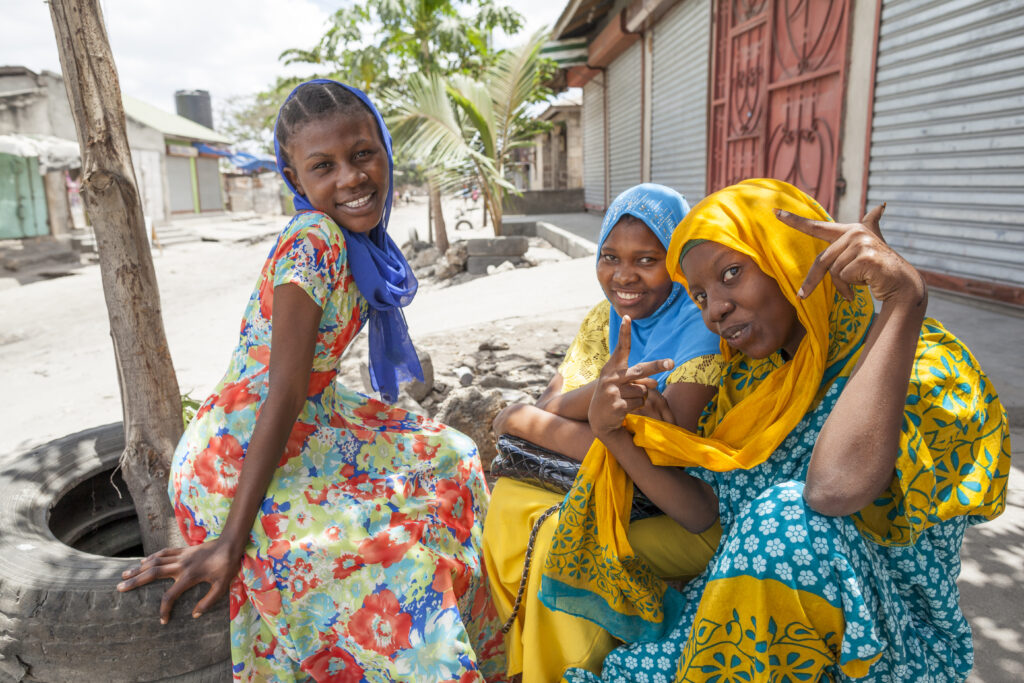
This technical brief captures what we learned and how we pivoted following our external 2018 mid-term evaluation.
